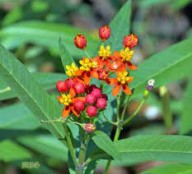Click here to view and print this article.
SPAWN is encouraging gardeners in Marin County to trade out their tropical milkweed plants for the locally native species, narrow-leaf milkweed (Asclepias fascicularis).
Tropical milkweed (Asclepias curassavica) is a plant familiar to most Bay Area gardeners. This non-native milkweed is a popular plant because many gardeners want to help support monarch butterflies. The Western monarch butterfly is in peril. In 2020, fewer than 2,000 monarch butterflies were counted in the annual Western Monarch Thanksgiving count, a 99.9% decline in population since the 1980’s, when monarchs overwintered in coastal areas from Marin to San Diego counties.
Planting milkweed in appropriate areas, five or more miles away from the coast, is an important way that gardeners can help to stabilize and increase the population of the Western monarch. However, tropical milkweed comes with several problems, including a protozoan parasite, OE (Ophryocystis elektroschirrha). The OE parasite lives on infected monarchs and is deposited on milkweed plants. Tropical milkweed does not go dormant, so there is no disruption in the breeding cycle of the parasite. In addition, the breeding and overwintering cycle of monarchs is disrupted by the presence of tropical milkweed in gardens because the plant does not go dormant in late fall like native milkweeds. Tropical milkweed encourages monarchs to stay inland and breed — instead of going to the coast during the late fall and early winter months.
Problems caused by tropical milkweed:
- Tropical milkweed encourages adult monarch butterflies to breed in the winter, which alters their migration patterns; adults lose energy and often don’t survive winter.
- During the winter there is often not enough milkweed available to feed caterpillars through all stages of their development, leading to starvation.
- The majority of larvae and butterflies, which develop during the winter, don’t survive the cold temperatures.
- The few butterflies that reach the coast often carry large loads of OE and spread it to the overwintering grounds.
In November 2021, SPAWN will exchange narrow-leaf milkweed for tropical milkweed plants. Check for eggs and caterpillars before uprooting any tropical milkweed. For more information contact SPAWN’s Nursery Manager Audrey Fusco, audrey@seaturtles.org.




